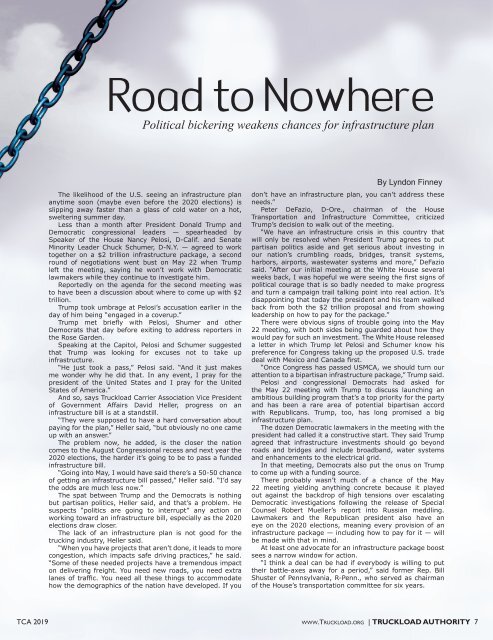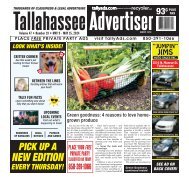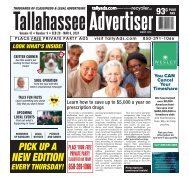TLA37_AllPages
You also want an ePaper? Increase the reach of your titles
YUMPU automatically turns print PDFs into web optimized ePapers that Google loves.
Road to Nowhere<br />
Political bickering weakens chances for infrastructure plan<br />
The likelihood of the U.S. seeing an infrastructure plan<br />
anytime soon (maybe even before the 2020 elections) is<br />
slipping away faster than a glass of cold water on a hot,<br />
sweltering summer day.<br />
Less than a month after President Donald Trump and<br />
Democratic congressional leaders — spearheaded by<br />
Speaker of the House Nancy Pelosi, D-Calif. and Senate<br />
Minority Leader Chuck Schumer, D-N.Y. — agreed to work<br />
together on a $2 trillion infrastructure package, a second<br />
round of negotiations went bust on May 22 when Trump<br />
left the meeting, saying he won’t work with Democratic<br />
lawmakers while they continue to investigate him.<br />
Reportedly on the agenda for the second meeting was<br />
to have been a discussion about where to come up with $2<br />
trillion.<br />
Trump took umbrage at Pelosi’s accusation earlier in the<br />
day of him being “engaged in a coverup.”<br />
Trump met briefly with Pelosi, Shumer and other<br />
Democrats that day before exiting to address reporters in<br />
the Rose Garden.<br />
Speaking at the Capitol, Pelosi and Schumer suggested<br />
that Trump was looking for excuses not to take up<br />
infrastructure.<br />
“He just took a pass,” Pelosi said. “And it just makes<br />
me wonder why he did that. In any event, I pray for the<br />
president of the United States and I pray for the United<br />
States of America.”<br />
And so, says Truckload Carrier Association Vice President<br />
of Government Affairs David Heller, progress on an<br />
infrastructure bill is at a standstill.<br />
“They were supposed to have a hard conversation about<br />
paying for the plan,” Heller said, “but obviously no one came<br />
up with an answer.”<br />
The problem now, he added, is the closer the nation<br />
comes to the August Congressional recess and next year the<br />
2020 elections, the harder it’s going to be to pass a funded<br />
infrastructure bill.<br />
“Going into May, I would have said there’s a 50-50 chance<br />
of getting an infrastructure bill passed,” Heller said. “I’d say<br />
the odds are much less now.”<br />
The spat between Trump and the Democrats is nothing<br />
but partisan politics, Heller said, and that’s a problem. He<br />
suspects “politics are going to interrupt” any action on<br />
working toward an infrastructure bill, especially as the 2020<br />
elections draw closer.<br />
The lack of an infrastructure plan is not good for the<br />
trucking industry, Heller said.<br />
“When you have projects that aren’t done, it leads to more<br />
congestion, which impacts safe driving practices,” he said.<br />
“Some of these needed projects have a tremendous impact<br />
on delivering freight. You need new roads, you need extra<br />
lanes of traffic. You need all these things to accommodate<br />
how the demographics of the nation have developed. If you<br />
By Lyndon Finney<br />
don’t have an infrastructure plan, you can’t address these<br />
needs.”<br />
Peter DeFazio, D-Ore., chairman of the House<br />
Transportation and Infrastructure Committee, criticized<br />
Trump’s decision to walk out of the meeting.<br />
“We have an infrastructure crisis in this country that<br />
will only be resolved when President Trump agrees to put<br />
partisan politics aside and get serious about investing in<br />
our nation’s crumbling roads, bridges, transit systems,<br />
harbors, airports, wastewater systems and more,” DeFazio<br />
said. “After our initial meeting at the White House several<br />
weeks back, I was hopeful we were seeing the first signs of<br />
political courage that is so badly needed to make progress<br />
and turn a campaign trail talking point into real action. It’s<br />
disappointing that today the president and his team walked<br />
back from both the $2 trillion proposal and from showing<br />
leadership on how to pay for the package.”<br />
There were obvious signs of trouble going into the May<br />
22 meeting, with both sides being guarded about how they<br />
would pay for such an investment. The White House released<br />
a letter in which Trump let Pelosi and Schumer know his<br />
preference for Congress taking up the proposed U.S. trade<br />
deal with Mexico and Canada first.<br />
“Once Congress has passed USMCA, we should turn our<br />
attention to a bipartisan infrastructure package,” Trump said.<br />
Pelosi and congressional Democrats had asked for<br />
the May 22 meeting with Trump to discuss launching an<br />
ambitious building program that’s a top priority for the party<br />
and has been a rare area of potential bipartisan accord<br />
with Republicans. Trump, too, has long promised a big<br />
infrastructure plan.<br />
The dozen Democratic lawmakers in the meeting with the<br />
president had called it a constructive start. They said Trump<br />
agreed that infrastructure investments should go beyond<br />
roads and bridges and include broadband, water systems<br />
and enhancements to the electrical grid.<br />
In that meeting, Democrats also put the onus on Trump<br />
to come up with a funding source.<br />
There probably wasn’t much of a chance of the May<br />
22 meeting yielding anything concrete because it played<br />
out against the backdrop of high tensions over escalating<br />
Democratic investigations following the release of Special<br />
Counsel Robert Mueller’s report into Russian meddling.<br />
Lawmakers and the Republican president also have an<br />
eye on the 2020 elections, meaning every provision of an<br />
infrastructure package — including how to pay for it — will<br />
be made with that in mind.<br />
At least one advocate for an infrastructure package boost<br />
sees a narrow window for action.<br />
“I think a deal can be had if everybody is willing to put<br />
their battle-axes away for a period,” said former Rep. Bill<br />
Shuster of Pennsylvania, R-Penn., who served as chairman<br />
of the House’s transportation committee for six years.<br />
TCA 2019 www.Truckload.org | Truckload Authority 7

















